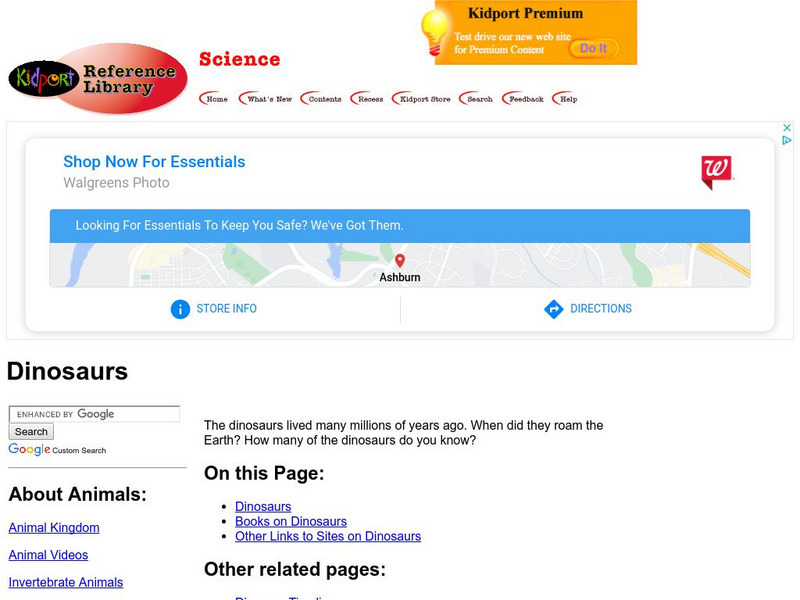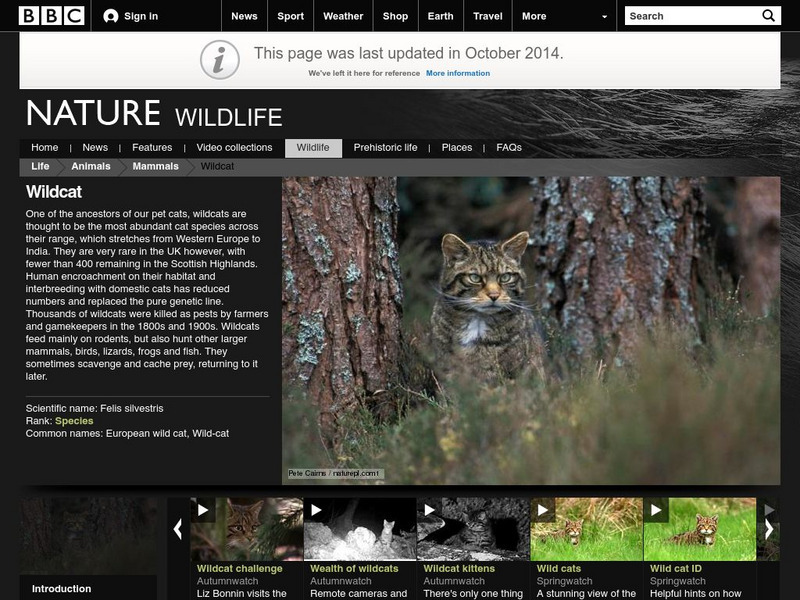Curated OER
Science Kids: Science Images: Afrovenator
This drawing shows the possible appearance of Afrovenator, a dinosaur from the mid Jurassic Period (around 160 million years ago). The name Afroventor means 'African Hunter', referring to the area they lived and the fact that they were...
Curated OER
Science Kids: Science Images: Allosaurus
This CGI drawing shows the possible appearance of Allosaurus, a dinosaur from the late Jurassic Period (around 150 million years ago). First described back in 1877, Allosaurus become one of the first well known dinosaurs. It was a...
Curated OER
Science Kids: Science Images: Carnotaurus
This CGI drawing shows the possible appearance of Carnotaurus, a dinosaur that lived at the end of the Cretaceous Period (around 66 million years ago). Carnotaurus was a meat eating dinosaur (carnivore) with small arms and fingers that...
Curated OER
Science Kids: Science Images: Giganotosaurus
This CGI drawing shows the possible appearance of Giganotosaurus, a dinosaur from the late Cretaceous Period (around 100 million years ago). Giganotosaurus was a carnivore (meat eater) that was even bigger than the more well known...
Curated OER
Science Kids: Science Images: Megalosaurus
This drawing shows the possible appearance of Megalosaurus, a dinosaur from the middle Jurassic Period (around 166 million years ago). Megalosaurus was a large Theropod and the first dinosaur to be formally named by the scientific...
Curated OER
Science Kids: Science Images: Spinosaurus
This CGI drawing shows the possible appearance of Spinosaurus, a dinosaur from the Cretaceous Period (around 100 million years ago). With huge spines growing from its back and the biggest size of any meat eating (carnivorous) dinosaur,...
Curated OER
Science Kids: Science Images: Spinosaurus Size Scale
This picture shows a scale size comparison between a Spinosaurus and a human. The Spinosaurus was the largest meat eating (carnivorous) dinosaur of all time, weighing anywhere between 7 and 20 tons and possibly reaching up to 17 metres...
Kidport
Kidport: Reference Library: Dinosaurs
A nicely illustrated and informative site on dinosaurs from the Cambrian period until the Quaternary period.
Treehut
Suzy's World: Eye
Find out how your eyes work and try an experiment involving a cartoon flip book.
Smithsonian Institution
Smithsonian National Zoo: Meet Our Animals
This site from the National Zoological Park provides extensive information about many types of animals. Just click on the category you need. Includes pictures and live web cams.
ClassFlow
Class Flow: Energy in the Ecosystem
[Free Registration/Login Required] This flipchart focuses on how plants and animals get energy and different habitats.
Other
Food Chains and Webs
A very informative site that discusses food chains and webs in detail. Not too complicated and fairly easy to understand, it also includes some pictures.
BBC
Bbc: Nature Wildfacts: Wildcat
This BBC webpage contains a detailed fact sheet and several colorful photos of the wildcat. Related articles can be found on this site as well.
Ducksters
Ducksters: Dinosaurs for Kids
Dinosaurs: Kids learn about these ancient animals that wondered the Earth thousands of years ago. We know about them from studying fossils.
PBS
Nh Pbs: Nature Works: Ecosystems
How would you define an ecosystem? Check out this educational resource to learn more about the living and nonliving parts of different ecosystems.
Science4Fun
Science4 Fun: Cat
Fun and interesting illustrated information on cats including appearance, diet, and habitat,
Mocomi & Anibrain Digital Technologies
Mocomi: Jaguar Facts and Information
Discover interesting facts about jaguars including characteristics, diet, and conservation status.
Mocomi & Anibrain Digital Technologies
Mocomi: Grizzly Bear Facts and Information
Find out the physical characteristics, life span, living habitats, and other interesting facts of grizzly bears.
Pittsburgh Zoo & PPG Aquarium
Pittsburgh Zoo: Amur Tiger
Amur tigers are also known as the Siberian tigers. Use this resource to discover more interesting facts about the largest living feline.
Pittsburgh Zoo & PPG Aquarium
Pittsburgh Zoo: African Lion
African lions are the only cats known to live in groups. Use this resource to learn why lions roar and other interesting facts.
Saint Louis Zoo
Saint Louis Zoo: California Sea Lion
Discover fun facts and learn about the habitat, range, appearance, diet, and conservation status of the California sea lion.
Other
Audubon Nature Institute: Amur Leopard
Meet the Amur leopard and discover facts about its behavior, eating habits, range, conservation status, and other unique facts.
Other
Audubon Nature Institute: River Otter
Meet the river otter and discover details about its behavior, eating habits, range, conservation status, and other unique facts.
Other
Audubon Nature Institute: California Sea Lion
Meet the California sea lion and discover details about its behavior, eating habits, range, conservation status, and other unique facts.
Other popular searches
- Carnivore +Herbivore(teeth)
- Herbivores Carnivores
- Carnivore Herbivore
- Omnivore Herbivore Carnivore
- Producers and Carnivores
- Herbivores and Carnivores
- Herbivore and Carnivore
- Herbivores. Carnivores
- Herbivore Carnivore Teeth
- Carnivores Omnivore Herbivores







